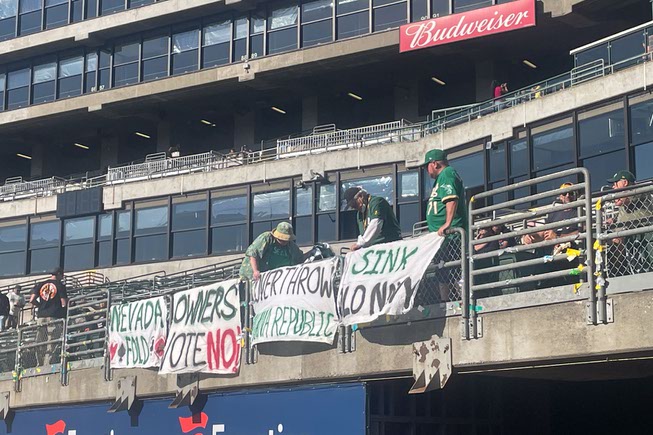
Casey Harrison
From left to right, Nina Thorsen, of Alameda, Calif., along with an As usher and Will MacNeil, of Dublin, Calif., tape homemade signs to the right-field fence at the Oakland-Alameda Coliseum on Saturday, Aug. 19, 2023. Thorsen and MacNeil are part of the Oakland 68s, a group of A’s megafans partnering with the Nevada State Education Association to circulate a petition to repeal a public financing bill for a new A’s stadium in Las Vegas.
Wednesday, Sept. 6, 2023 | 4:07 p.m.
A political action committee opposed to a $380 million public funding package to lure the Oakland Athletics to Las Vegas has filed a petition with the Nevada Secretary of State’s Office seeking to subject the funding bill to a public vote.
Schools Over Stadiums, created by the Nevada State Educators Association following the passage of the funding bill in June, filed a referendum petition seeking to repeal the state tax funding dedicated to stadium bonds, the group said.
“Schools Over Stadiums has been committed to pursuing every possible path to stop the use of public funds to subsidize a billionaire’s stadium and that has always included putting the question to Nevada voters who were effectively shut out of the process,” Dawn Etcheverry, president of the NSEA and Schools Over Stadiums, said in a statement.
“Nevada’s priorities are misguided and when we launched Schools Over Stadiums in June, our goal was to ensure that public funds go to the services Nevadans depend on like our public schools, not to a California billionaire for a stadium,” she said.
The $380 million in public financing would go toward a proposed $1.5 billion stadium at the site of the Tropicana on the Strip.
Schools Over Stadiums has teamed with Oakland fans who want to keep the team in the San Francisco Bay Area in an attempt to stymie implementation of the bill.
The June 15 signing of SB1 all but ended the A’s quest for a new stadium in Oakland, after negotiations stalled following years of back-and-forth with city officials.
Team owner John Fisher said last month the team has sent its relocation application to Major League Baseball, and owners could vote to approve the move as early as December. The ballpark is expected to open in time for the 2028 season.
Alexander Marks, a spokesman for the PAC, said the goal of the petition is to strip public funding for the deal “regardless of what state and county officials agree to do in any sort of development deal.”
“We’re excited to get out there and start gathering signatures from Nevadans who want to put our schools first,” Marks said in a statement.
“We’re confident that a majority of Nevadans will join us in taking action to put Nevada’s priorities back in line so we can address an education system that ranks 48th in funding with the largest class sizes and highest vacancies in the country,” he said.
Petition organizers have until June 26 to collect enough signatures to get a referendum question on the ballot.
The petition needs the signatures of at least 10% of the voters who participated in the 2022 general election, or 102,362 signatures, according to the Secretary of State’s Office.
Further, of the signatures required, at least 25,591 must be from each of Nevada’s four Congressional districts.
The public-funding bill establishes a so-called waterfall of fail-safes that would be triggered in the event Clark County is unable to back its bonds.
The bonds will be funded by 17 taxes, including sales tax, live entertainment taxes and payroll taxes, Jeremy Aguero, principal analyst of Las Vegas-based Applied Analysis and an A’s lobbyist, told lawmakers in June.
The bill is structured so that the state would pay up to $180 million in transferable tax credits, of which $120 million could be made refundable. That’s paired with roughly $125 million in general obligation bonds issued by Clark County. The county would also invest a separate $25 million for infrastructure surrounding the stadium.
Until $45 million of those tax credits are repaid by revenues generated by the project, 90% of the proceeds remaining after the payments would be refunded to the state, with the last 10% going to a homelessness prevention fund managed by Clark County and nearby cities.
That turns into an 80%-20% split once $60 million has been recuperated by the state.
For every dollar dedicated to the principal and interest payments of the bonds, another dollar must be available for the project.
Half of that coverage would come from cash backed by the county, and the other half would come from a state-backed line of credit, Aguero said.
In all, it would take four years of the project generating no revenue before Clark County would need to tap into its general fund to back the stadium bonds, he said.
The bill requires that for every dollar dedicated to the principal and interest payments of the bonds, another dollar must be available for the project itself. Half that coverage would come from cash backed by the county, and the other half would come from a state-backed line of credit, Aguero said. Those sources of coverage would be the first two mechanisms triggered.
If those sources prove insufficient to back the bonds, the county would then use two reserves as a backstop: the first round of the average annual debt service (AADS) funding would be backed by Clark County upon issuing the bonds, and the second year of reserves would be generated by tax revenue flowing into the project.
In any event, reserves that come from AADS would stay in a bank account that could only be used if Clark County is unable to pay its debt obligation.
[email protected] / 702-990-2681 / @Casey_Harrison1

